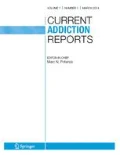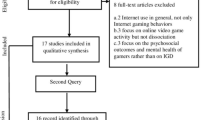Abstract
Purpose of Review
This review provides a summary of the literature (2012–2018) regarding dissociative experiences in Gambling Disorder (GD). We provide an overview of conceptualizations of dissociation, its relationship to GD, dissociation within specific types of gambling, and harm reduction strategies targeting gambling-related dissociative experiences.
Recent Findings
The gambling literature lacks a unified conceptualization of dissociative experiences, and measures different aspects of dissociation across studies. The propensity of some individuals toward general and in-game dissociation appears to be involved in the development and/or maintenance of GD. Several features of gambling may facilitate in-game dissociation, particularly among individuals with GD. As such, tools that disrupt in-game dissociation may be crucial for harm reduction.
Summary
Future research should be aimed at developing a single, operational definition of dissociation in gambling, and this should be systematically examined across gambling modalities. Additionally, ongoing refinement of interventions that effectively interrupt in-game dissociation holds promise for reducing gambling-associated harms.
Similar content being viewed by others
References
Papers of particular interest, published recently, have been highlighted as: • Of importance
McCormick J, Delfabbro P, Denson L. Psychological vulnerability and problem gambling: an application of Durand Jacobs’ general theory of addictions to electronic gaming machine playing in Australia. J Gambl Stud. 2012;28(4):665–90. https://doi.org/10.1007/s10899-011-9281-x.
American Psychiatric Association. Diagnostic and statistical manual of mental disorders. 5th ed. Washington, DC: American Psychiatric Association; 2013.
Griffiths M, Wood R, Parke J, Parke A, editors. Dissociative states in problem gambling. Current issues related to dissociation. Melbourne, AU: Australian gaming council; 2006.
McKeith C, Rock A, Clark G. Trait mindfulness, problem-gambling severity, altered state of awareness and urge to gamble in poker-machine gamblers. J Gambl Stud. 2017;33(2):617–32. https://doi.org/10.1007/s10899-016-9635-5.
Murch WS, Chu SWM, Clark L. Measuring the slot machine zone with attentional dual tasks and respiratory sinus arrhythmia. Psychol Addict Behav. 2017;31(3):375–84. https://doi.org/10.1037/adb0000251.
Murch WS, Clark L. Effects of bet size and multi-line play on immersion and respiratory sinus arrhythmia during electronic gaming machine use. Addict Behav. 2019;88:67–72. https://doi.org/10.1016/j.addbeh.2018.08.014.
• Dixon M, Stange M, Larche C, Graydon C, Fugelsang J, Harrigan K. Dark flow, depression and multiline slot machine play. J Gambl Stud. 2018;34(1):73–84. https://doi.org/10.1007/s10899-017-9695-1 Addresses the propensity for mult-line games to facilitate dissociative experiences while gambling, particularly for individuals with GD.
Bernstein ME, Putnam WF. Development, reliability, and validity of a dissociation scale. J Nerv Ment Dis. 1986;174(12):727–35. https://doi.org/10.1097/00005053-198612000-00004.
Jacobs D. Evidence for a common dissociative-like reaction among addicts. J Gambling Stud. 1988;4(1):27–37. https://doi.org/10.1007/BF01043526.
Tozman T, Magdas ES, MacDougall HG, Vollmeyer R. Understanding the psychophysiology of flow: a driving simulator experiment to investigate the relationship between flow and heart rate variability. Comput Hum Behav. 2015;52:408–18. https://doi.org/10.1016/j.chb.2015.06.023.
Duschek S, Muckenthaler M, Werner N, Reyes del Paso GA. Relationships between features of autonomic cardiovascular control and cognitive performance. Biol Psychol. 2009;81(2):110–7. https://doi.org/10.1016/j.biopsycho.2009.03.003.
Diskin KM, Hodgins DC. Narrowed focus and dissociative experiences in a community sample of experienced video lottery gamblers. Can J Behav Sci. 2001;33(1):58–64. https://doi.org/10.1037/h0087128.
Hopley AA, Nicki RM. Predictive factors of excessive online poker playing. Cyberpsychol Behav Soc Netw. 2010;13(4):379–85. https://doi.org/10.1089/cyber.2009.0223.
• Blaszczynski A, Cowley E, Anthony C, Hinsley K. Breaks in play: do they achieve intended aims? J Gambl Stud. 2016;32(2):789–800. https://doi.org/10.1007/s10899-015-9565-7 Examines the effect of breaks in gambling on in-game dissociation and cravings to continue gambling. The article suggests that breaks in play themselves may not reduce dissociation, and highlights the need for developing harm reduction tools that are persoally relevant to the individual gambling.
Carlbring P, Degerman N, Jonsson J, Andersson G. Internet-based treatment of pathological gambling with a three-year follow-up. Cogn Behav Ther. 2012;41(4):1–14. https://doi.org/10.1080/16506073.2012.689323.
Cartmill T, Slatter T, Wilkie B. The role of anxiety and dissociation in young australian gamblers. J Gambl Stud. 2015;31(4):1215–26. https://doi.org/10.1007/s10899-014-9510-1.
Dixon MJ, Graydon C, Harrigan KA, Wojtowicz L, Siu V, Fugelsang JA. The allure of multi-line games in modern slot machines. Addict. 2014;109(11):1920–8. https://doi.org/10.1111/add.12675.
Gori A, Craparo G, Caretti V, Giannini M, Iraci-Sareri G, Bruschi A, et al. Impulsivity, alexithymia and dissociation among pathological gamblers in different therapeutic settings: a multisample comparison study. Psychiatry Res. 2016;246:789–95. https://doi.org/10.1016/j.psychres.2016.10.046.
• Imperatori C, Innamorati M, Bersani FS, Imbimbo F, Pompili M, Contardi A, et al. The association among childhood trauma, pathological dissociation and gambling severity in casino gamblers. Clin Psychol Psychother. 2017;24(1):203–11. https://doi.org/10.1002/cpp.1997 Provides a potential explanation for the association between general dissociation and GD severity. The article suggests that general dissociation may mediate the relationship between childhood trauma and gambling disorder severity.
Oakes J, Pols R, Battersby M, Lawn S, Pulvirenti M, Smith D. A focus group study of predictors of relapse in electronic gaming machine problem gambling, part 2: factors that ‘pull’ the gambler away from relapse. J Gambl Stud. 2012;28(3):465–79. https://doi.org/10.1007/s10899-011-9267-8.
Pattinson J. British older adult gambling behaviour; evaluating psychological and physical health as predictive risk for problem gambling. J Gambl Issues. 2016;34(4). https://doi.org/10.4309/jgi.2016.34.4.
Rémond J-J, Romo L. Analysis of gambling in the media related to screens: immersion as a predictor of excessive use? Int J Environ Res Public Health. 2018;15(1). https://doi.org/10.3390/ijerph15010058.
Stewart MJ, Wohl MJA. Pop-up messages, dissociation, and craving: how monetary limit reminders facilitate adherence in a session of slot machine gambling. Psychol Addict Behav. 2013;27(1):268–73. https://doi.org/10.1037/a0029882.
• Tricker C, Rock A, Clark G. Cue-reactive altered state of consciousness mediates the relationship between problem-gambling severity and cue-reactive urge in poker-machine gamblers. J Gambl Stud. 2016;32(2):661–74. https://doi.org/10.1007/s10899-015-9549-7 Examines the role of in-game dissociation as a mediator between gambling severity and cravings to gamble. This is examined within the context of electronic gambling specifically.
Wohl MJA, Parush A, Kim HS, Warren K. Building it better: applying human–computer interaction and persuasive system design principles to a monetary limit tool improves responsible gambling. Comput Hum Behav. 2014;37(C):124–32. https://doi.org/10.1016/j.chb.2014.04.045.
Carlson EB, Putnam FW. An update on the dissociative experiences scale. Dissociation: Prog Dissociative Disord. 1993;6(1):16–27.
Waller NG, Ross CA. The prevalence and biometric structure of pathological dissociation in the general population: Taxometric and behavior genetic findings. J Abnorm Psychol. 1997;106(4):499–510.
Pekala RJ. The Phenomenology of Consciousness Inventory. In: The phenomenology of consciousness inventory. Quantifying consciousness: an empirical approach. Boston, MA: Springer US; 1991. p. 127–43.
Bouchard S, Robillard G, Renaud P. Questionnaire sur la propension à l’immersion. 2002.
Cohen J. Statistical power analysis for the behavioral sciences. 2nd. Hillsdale, NJ: Erlbaum; 1988.
Gupta R, Nower L, Derevensky JL, Blaszczynski A, Faregh N, Temcheff C. Problem gambling in adolescents: an examination of the pathways model. J Gambl Stud. 2013;29(3):575–88. https://doi.org/10.1007/s10899-012-9322-0.
Biolcati R, Passini S, Griffiths M. All-in and bad beat: professional poker players and pathological gambling. Int J Ment Health Addiction. 2015;13(1):19–32. https://doi.org/10.1007/s11469-014-9506-1.
Ledgerwood DM, Petry NM. Psychological experience of gambling and subtypes of pathological gamblers. Psychiatry Res. 2006;144(1):17–27. https://doi.org/10.1016/j.psychres.2005.08.017.
Lyssenko L, Schmahl C, Bockhacker L, Vonderlin R, Bohus M, Kleindienst N. Dissociation in psychiatric disorders: a meta-analysis of studies using the dissociative experiences scale. Am J Psychiatry. 2018;175(1):37–46. https://doi.org/10.1176/appi.ajp.2017.17010025.
Schüll ND. Addiction by design : machine gambling in Las Vegas. Princeton: Princeton: Princeton University Press; 2012.
Finlay K, Marmurek H, Kanetkar V, Londerville J. Effects of slot machine characteristics on problem gambling Behaviour. Final report Guelph: Ontario Problem Gambling Research Centre; 2005.
Gainsbury S, Blaszczynski A. Breaks in play: Epowering gamblers through in-game harm minimization features for electronic gaming machines. J Gambl Ind Reg. 2016;4:35–9.
Author information
Authors and Affiliations
Corresponding author
Ethics declarations
Conflict of Interest
The authors declare that they have no competing interests.
Human and Animal Rights and Informed Consent
This article does not contain any studies with human or animal subjects performed by any of the authors.
Additional information
Section Editors: J. Billieux and A. Schimmenti
Publisher’s Note
Springer Nature remains neutral with regard to jurisdictional claims in published maps and institutional affiliations.
This article is part of the Topical Collection on Dissociation and Addictive Behaviors
Rights and permissions
About this article
Cite this article
Schluter, M.G., Hodgins, D.C. Dissociative Experiences in Gambling Disorder. Curr Addict Rep 6, 34–40 (2019). https://doi.org/10.1007/s40429-019-0238-y
Published:
Issue Date:
DOI: https://doi.org/10.1007/s40429-019-0238-y



